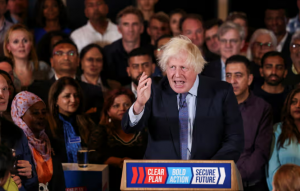We are seeing a Conservative movement so bereft, so out of ideas, that it’s replaying its old hits. At the end of their reign, with Britain poorer, sicker and less free, it is unclear where the Tories go now. Still, idiocy does adore a vacuum, and so it’s time to talk about Boris Johnson again.
On Sunday, the disgraced former occupant of No 10 suggested Keir Starmer would be putting Britain “on the road to serfdom” if he sought improvements to the shambolic Brexit deal that Johnson struck. Even now, he and those who still laud him seem incapable of understanding the damage they have done. Where once we could travel, live and work freely across the continent, Britons now face time limits, visa fees and roaming charges. Where once our businesses could sell as easily to someone in Berlin as someone in Birmingham, they now get red tape, delays and additional charges. And pertinent to the allegation levelled by Johnson, where once the British people had a say in the rules that govern our trade with our largest market, we now have none.
Instead of “Britannia unchained” we have Britannia unanchored, our country adrift, more vulnerable to economic headwinds and the whims of bigger global players. Even accounting for Covid and Ukraine, Brexit has caused higher consumer prices and lower economic growth, and all for benefits no one can articulate without the preface : “Well, maybe in the coming decades …” Those who claim there are Brexit opportunities rarely go into the detail. When they do, they almost never explain the trade-offs.
So ignore revisionism, it’s Johnson who delivered “serfdom” for the UK. He said “fuck business” and he delivered.
Fixing the problems Britain faces after Brexit won’t be easy. Starmer has pledged that economic growth must be the overriding priority for his government. The quickest and most obvious way of achieving this without any additional investment or revenue-raising is removing the Brexit straitjacket from UK plc. But having said that access to the customs union and single market access is unlikely in his lifetime, what space remains for Starmer to improve Johnson’s deal?
Quite a bit, actually. Last year, crossparty MPs and industry leaders of the UK Trade and Business Commission published 114 recommended fixes to the Brexit deal, all of which fall within Starmer’s red lines. These proposals were endorsed by business at the Trade Unlocked conference. They are also extremely popular with the British public.
They’re a good place to start and there are things the EU wants, too. An ill-timed request for talks about youth mobility was clearly an early exercise in Brussels kite-flying, and we know they’re also keen on increased security and defence cooperation. From our side, British businesses, farmers, fishers, employers, manufacturers, researchers and innovators all need regulatory certainty. Just as the Conservative government agreed to align with high EU standards due to the economic cost of doing otherwise, this Labour government can codify it. Beneficial alignment would provide the certainty that businesses have been deprived of for almost a decade and boost direct investment.
Johnson has billed the European political community summit next week as a decisive showdown. Instead, it will be a valuable opportunity for the new UK government to build trust with its continental counterparts. But the real work on trade will start away from the pomp and ceremony of Blenheim Palace, with ongoing dialogue intensifying as we approach the official review of the UK-EU Trade Cooperation Agreement in 2026.
Crucially, Starmer must strike a new tone with our European neighbours, something he may have achieved already through optics alone. Together we face existential external threats. We cannot afford more phoney wars with our closest democratic allies while authoritarians are poised to dismantle democracy in the US and are crossing borders in Europe – another reason Johnson’s battle metaphors in the context of EU relations are particularly obnoxious.
Johnson fancies himself a student of history, so his charge that Starmer is pursuing a Tsarist Russia-style great retreat from Brexit is unlikely to be accidental. But if he knew anything about history, Johnson would understand that for a good general, retreat is by far the best call when a plan proves fatally flawed or to have been terribly executed. Both are true in the case of Johnson’s Brexit. Starmer should ignore the hyperbole about serfdom: any retreat from what Johnson delivered is likely to be a winning strategy.
The Guardian

